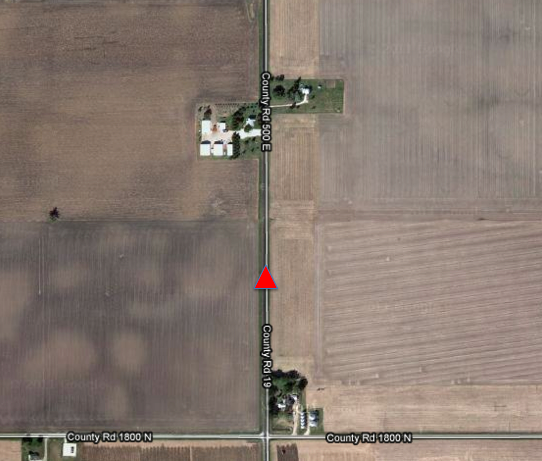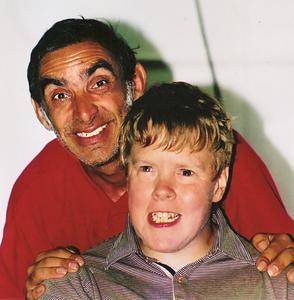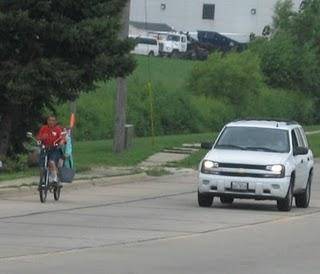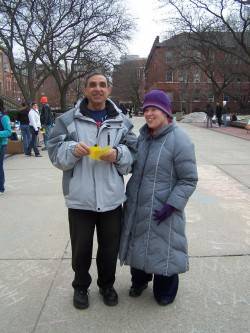 Most of us do it without a thought — grab our keys, strap on our seatbelts, shift into drive, go from home to work, home to school, home to the grocery so many times that we don’t remember the particulars. We don’t remember closing the garage door behind us, stopping at the stop sign down the block, or putting the parking brake on. We didn’t see the pedestrian waiting for us to yield at the crosswalk, the cyclist we cut off while making a right turn, or the motorist we pulled out in front of. What is the price of this mental absenteeism? What do we risk by allowing ourselves to ease into autopilot when we get behind the wheel?
Most of us do it without a thought — grab our keys, strap on our seatbelts, shift into drive, go from home to work, home to school, home to the grocery so many times that we don’t remember the particulars. We don’t remember closing the garage door behind us, stopping at the stop sign down the block, or putting the parking brake on. We didn’t see the pedestrian waiting for us to yield at the crosswalk, the cyclist we cut off while making a right turn, or the motorist we pulled out in front of. What is the price of this mental absenteeism? What do we risk by allowing ourselves to ease into autopilot when we get behind the wheel?
“NO JUSTIFIABLE EXCUSE”
On Monday, March 7th at 4:30 p.m., Champaign residents Cindy and David Combs were struck by a motor vehicle, leaving Cindy dead and David critically injured. This tragedy has left many in Champaign County grieving for the lively, sunny couple who were victims of what appears to be a wholly avoidable crash.

The couple was riding their tandem bicycle south on County Road 500E, just north of 1800 E, when they were struck from behind by a Honda Accord driven by Errol T. Maul. Maul struck the couple with the passenger side of his car with a force great enough to mangle their tandem bicycle and throw Cindy onto the hood of the car, cracking the windshield. There were no skid marks on the road to indicate the driver braked, and debris (shards of reflector and fender, chunks of helmet foam) was strewn along the side of the road for 75-100 yards. Cindy was pronounced dead at the scene due to multiple injuries resulting from the crash, and David was taken to Carle Hospital, where he remains in critical but stable condition.
While the Champaign County Sheriff’s Department has not yet released either the accident reconstruction or the accident report (and won’t until the decision is made on whether criminal charges will be filed), a short drive down this stretch of country road offers a glimpse of how avoidable this crash must have been.
500E, like most out-of-town roads, is straight, flat, with few visual obstacles. It is 22 feet wide, providing ample room for a car and bicycle to pass side-by-side. It was well before sundown, and the Combs rode a tandem bicycle with a trailer attached and a tall flag mounted to the frame for increased visibility. It is hard to imagine a scenario where a motorist could miss such a distinct sight.
Lt. Allen Jones of the Champaign County Sheriff’s Department reported that Maul, an employee of Farm Credit Services of Illinois, admitted that he was reading a plat book, a book of land maps, when he struck the Combs. While the Sheriff’s Department is still investigating other possible factors, such as cell phone usage and drug or alcohol impairment, Lt. Jones believes there is “no justifiable excuse” for Maul crashing into the Combs. “Clearly, he’s at fault.”
“A SYNERGISTIC RELATIONSHIP”
 Cindy and David Combs were not your average cyclists, nor your average Champaign citizens. In 1983 they met at the Developmental Services Center (DSC), a non-profit organization that provides services and support to children and adults with developmental disabilities. Chief Executive Officer Dale Morrissey explains that the mission of DSC is “to help people with disabilities live as independent lives as they possibly can — where they live, where they work, where they recreate — anything in their lives to make them become more independent individuals who live fulfilling lives.”
Cindy and David Combs were not your average cyclists, nor your average Champaign citizens. In 1983 they met at the Developmental Services Center (DSC), a non-profit organization that provides services and support to children and adults with developmental disabilities. Chief Executive Officer Dale Morrissey explains that the mission of DSC is “to help people with disabilities live as independent lives as they possibly can — where they live, where they work, where they recreate — anything in their lives to make them become more independent individuals who live fulfilling lives.”
After three years of working together at the DSC, David and Cindy announced to their friends and families that they were getting married, and with the support of the DSC staff they moved into an apartment together. Although both David and Cindy had developmental disabilities and Cindy was blind, Morrissey describes how in their 25 years together they relied on each other’s strengths to become stronger and more able than they were alone. “Because the two of them had various abilities — Cindy could do certain things that helped David very much, and David could do certain things, like riding the bicycle, that helped Cindy — together they became much more independent than they could have as individuals.”
The Combs used their tandem to get to both of their jobs, as well as their numerous community activities. They were actively involved in their church, and Cindy sang for both the Parkland Pops and the Parkland Chorus, where David was heavily involved as head usher. They both were adamant supporters of the mission of the DSC, attending rallies to push for funding of the organization. As well, Cindy had become a vocal advocate in the community, and was involved in the “Spread the Word to End the Word” campaign, a nationwide effort to stop use of the “r-word”.
But the bicycle was not just a means of transportation for the Combs, it was also one of their greatest sources of enjoyment. Champaign Cycle owner Peter Davis knew David and Cindy as regular customers of his shop, where David would come by nearly once a week to maintain their multiple bikes, as well as socialize with the shop staff and customers. “It was a great point of pride with David as to how many miles he had on his bike at any point,” Davis says. “He was in the week before they were hit, and he had 14,050 miles on [the tandem].”
 The Combs were regular riders on the Prairie Cycle Club Tuesday night ride departing from Champaign Cycle, and they were a buoyant addition to the energy of the weekly ride. Davis recalls that “people knew them everywhere they would go, because they were both very outgoing, friendly people, and they would engage people.” Morrissey agrees, remembering Cindy as “a very, very upbeat person…she was not shy to tell people how much she cared for them, and lived life in a very positive light that we could all learn from.”
The Combs were regular riders on the Prairie Cycle Club Tuesday night ride departing from Champaign Cycle, and they were a buoyant addition to the energy of the weekly ride. Davis recalls that “people knew them everywhere they would go, because they were both very outgoing, friendly people, and they would engage people.” Morrissey agrees, remembering Cindy as “a very, very upbeat person…she was not shy to tell people how much she cared for them, and lived life in a very positive light that we could all learn from.”
“This is truly a tragedy,” Davis says, “and a big part of the tragedy is that Cindy and David were truly a couple. They were a unit. They had a synergistic relationship, and the whole was much greater than the sum of the parts. The two of them together managed their lives very well, and my fear for David now is that he has lost that other half of him that made his life work very nicely. While we can all be touched by someone who loses a spouse, regardless of the cause, in this instance it’s more than the norm, because they were so linked in their abilities to make their independent life work.”
NEGLIGENT OR RECKLESS? MISDEMEANOR OR FELONY?
So what are the appropriate legal consequences for Maul, the motorist who struck the Combs? That decision will be made by States’ Attorney Julia Rietz, who faced a similar decision in 2006 when University of Illinois Engineering graduate Matt Wilhelm was struck and killed by a motorist downloading ring tones on her cell phone. Wilhelm was cycling on High Cross Road (IL Route 130) when Jennifer Stark drove her car off the road, rear-ending Wilhelm with the front driver’s side of her vehicle.
Because Illinois has no negligent homicide law, the only felony Stark could be charged with was reckless homicide, a charge that requires proof of “willful or wanton” behavior. No legal precedent for convicting distracted drivers of negligent homicide existed, and Rietz felt Stark would have been acquitted of the more severe charge in court. Instead, Rietz charged Stark with improper lane usage, a misdemeanor resulting in a $1,000 fine, six months of probation, and traffic school.
Afterwards, Rietz advocated for enactment of a negligent homicide law, which would have allowed harsher penalties for distracted motorists who kill other users of the road. The bill was not supported by other Illinois counties’ attorneys or the state legislature, however, and the attempt was, for the time, abandoned.
The legal options since Wilhelm’s death, however, have changed. Last summer, the Illinois state legislature passed a law that opens up new possibilities for prosecuting motorists who drive too close to vulnerable users of the road, such as cyclists and pedestrians. The new anti-harassment law states that “a person driving a motor vehicle shall not, in a reckless manner, drive the motor vehicle unnecessarily close to, toward, or near a bicyclist, pedestrian, or a person riding a horse or driving an animal drawn vehicle”. Anyone found in violation of this statute is guilty of a class 3 felony if that violation results in “great bodily harm or permanent disability or disfigurement to another”, and can be sentenced to up to five years in a state penitentiary and up to $25,000 in fines.
It remains to be seen whether the new law will cover motorists who cause death or serious injury due to distracted driving. The law requires that the motorist behave in a “reckless” manner, a clause that requires willful or wanton disregard. Interpretation of the anti-harassment law requires a close look at Illinois case history, and in particular, at the definition of “recklessness”.
According to the 1973 case People v. Mitchell (293 N.E.2d 683), recklessness requires “conscious disregard of a substantial and unjustifiable risk that circumstances exist or that a result will follow”. In other words, “recklessness requires gross deviation from the standard of care which a reasonable man would exercise in the situation.” Informal communications with Mrs. Rietz suggest she is concerned that a legal precedent still does not exist to convict distracted drivers of a crime of this magnitude. Numerous attempts to reach Mrs. Rietz for comment were unsuccessful. (UPDATE 2 p.m., 3/23/11: Rietz responded by email with some additional information. Please see her comments two paragraphs down.)
This past summer, however, a Lake County, Ill., motorcyclist found herself the victim of a distracted driver. Motorist Lora Hunt struck and killed Anita Zaffke while approaching a yellow light, and admitted to painting her nails in the vehicle before she struck Zaffke. Hunt was convicted of reckless homicide and was sentenced to 18 months of limited imprisonment, allowing her to work and receive counseling during the day, but requiring her to be imprisoned at night. Reckless homicide requires the same proof of willful or wanton behavior as is required in the anti-harassment law.
Ian S. Kasper, a Waukegan, Ill., attorney specializing in criminal and traffic law, believes the Lake County case demonstrates a legal precedent for prosecuting distracted drivers. Kasper asserts that “there is no downside for [Rietz] to charge the driver with both reckless homicide and the [anti-harassment law] violation,” meaning Maul would be charged with both reckless homicide and improper passing of a cyclist. “The grand jury would almost certainly indict whatever is asked of them, and the trial jury can choose from the simple reckless homicide charge and the improper passing charges during their deliberation.”
UPDATE 2 p.m., 3/23/11: Rietz responds, “With regard to Mr. Kasper’s comments, I would note that in Champaign County we do not use the grand jury in the manner he suggests. In fact, we do not regularly use a grand jury, although by statute we could call for a special grand jury if needed. When we make a charging decision, the final responsibility for that decision lies with the State’s Attorney’s Office, and ultimately with me as the elected State’s Attorney. I do not pass off the responsibility for analyzing the evidence and the law onto the grand jury; I think that is an abdication of my ethical obligation to do justice for all involved. And as I said previously, until we receive the final report in this case, I can’t speculate as to what decision we might make with regards to this matter.”
Kasper also points out that “the State can also use the improper passing charge to bolster a traffic charge of passing too close, and educate the jury about Illinois’ 3-foot passing rule,” the law that requires motorists allow a minimum of three feet when passing a cyclist. Other local and nationally practicing attorneys we spoke to agreed with Kasper’s opinion on the case.
Many locals agree that Maul should be charged with something more serious than a misdemeanor. It is City Transportation Planning Consultant Cynthia Hoyle’s opinion that “the Vulnerable Users Bill that was passed last year by our state representatives and signed by the governor was intended to address exactly this sort of situation. It doesn’t do us any good to have these laws if we do not apply them.”
WHAT YOU CAN DO
 The citizens affected by this tragedy hope that raising awareness about this devastating crash will encourage motorists to take an honest look at the distractions they allow while behind the wheel.
The citizens affected by this tragedy hope that raising awareness about this devastating crash will encourage motorists to take an honest look at the distractions they allow while behind the wheel.
Champaign County Bikes‘ Chair and League of American Bicyclists’ Certified Safety Instructor Gary Cziko reminds motorists that “any time you get into a car you have to realize that you’re operating a deadly weapon. You can so easily seriously injure or kill somebody.”
Hoyle, also a LAB Certified Safety Instructor, also cautions that “when we are driving a vehicle we are responsible for the safety of not only ourselves but other people on the road. We need to be paying attention because our negligence behind the wheel could result in a tragedy that impacts many, many lives.”
Davis encourages both motorists and cyclists to learn the rules and responsibilities of the road, but cautions that “both communities have a way to go to understand how they can quite comfortably, without disruption, share the roads.” While cyclists may delay or startle a motorist when not obeying traffic laws, when a motorist does so, “the risk [to the cyclist] is not upset or delay, it’s bodily injury or death. Sometimes I think that motorists don’t think about that-the potential gravity of the consequences of their interactions vis-à-vis cyclists.”
“What’s sort of frightening about this,” says Cziko, “is that I think that we all as drivers have been distracted at one point or another. It’s really frightening to realize that at any one of those moments, if it was more than a second or two, we could have done the same thing [as Maul]. You really just can’t take that chance. We really need to learn from things like this. As tragic as it can be, you need to have the resolve that when you’re driving, it’s a full time job, and you need to drive safely.”
David Combs remains in critical care at Carle, and has a long road ahead of him to be totally rehabilitated. The staff of the DSC has supported David and his family from the moment they heard about the crash, and their primary goal is to continue to assist David as he moves forward in his recovery. When asked what the community can do to honor Cindy’s memory, DSC CEO Dale Morrissey reflects on Cindy’s mission for equal treatment: “All people, regardless of their abilities and disabilities, can become much more independent and do a lot more than a lot of us think they can do. I think that she would not like people to label others by their limitations, but recognize how given the proper opportunities they can become more independent and productive.”
Donations to the Developmental Services Center in Cindy’s honor can be made by calling 217-356-9176.
Donations can be sent to the “David Combs Recovery Fund” at First State Bank, 101 Windsor Road, Champaign, IL 61820 (217-239-3000).
Photos of the Combses provided by: Developmental Services Center, Champaign Cycling Ventures (Sue Jones), and Jennifer Schrad.
Annie was a guest on SP Radio on March 11, where she spoke about the crash. Click here to listen.
UPDATE (11:30 a.m., 4/16/11): Errol Maul’s court case has been assigned case #11TR4615, and is now searchable on the Champaign County Circuit Court Clerk’s site. Maul is scheduled to appear in court on Monday, April 18, at 1:30 p.m. in Courtroom L at the Champaign County Courthouse. The docket information is as follows:
- 03-11-11 Complaint 01 Count 001 FAIL TO REDUCE SPEED; Statute 625 5/11-601(a) Class P Orig.; Agency: CHAMPAIGN COUNTY SHERIFF Ticket#: 43531; Bond Type: Case set for docket call, notice prepared and mailed.
- 04-15-11 Complaint 02 Count 002 IMPROPER PASSING/SAFE DISTANCE; Statute 625 5/11-703(d) Class P Orig. Agency: CHAMPAIGN COUNTY SHERIFF; Ticket#: 9999999; Bond Type Personal Recognizance/Individual Bond
UPDATE (12:40 p.m., 4/18/11): Maul has pled guilty in advance of his scheduled hearing to the two petty charges (failure to reduce speed and improper passing distance), which carry a fine of $1,000 each. It was also the understanding of at least one attendee at a meeting held by Rietz on Friday that Maul’s license would be revoked as part of the bicyclist anti-harassment law put into effect in January 2011; we’re working to verify that. The News-Gazette posted an article at noon which has more quotes from Rietz. Smile Politely will have more coverage in the coming days.








